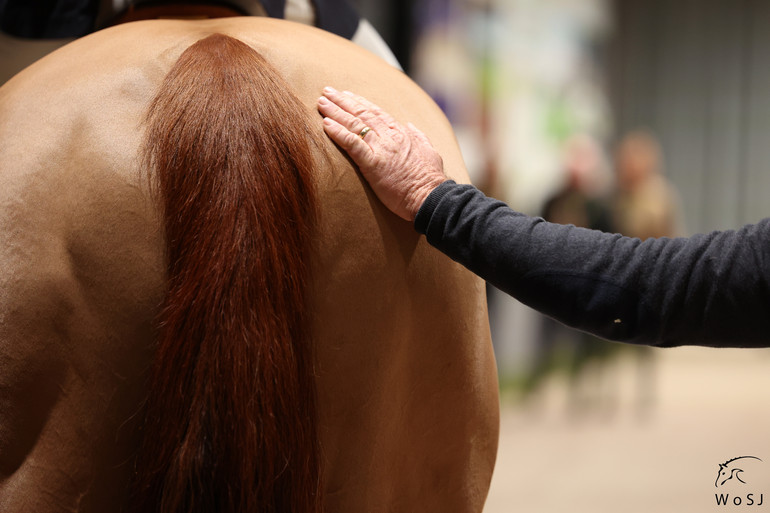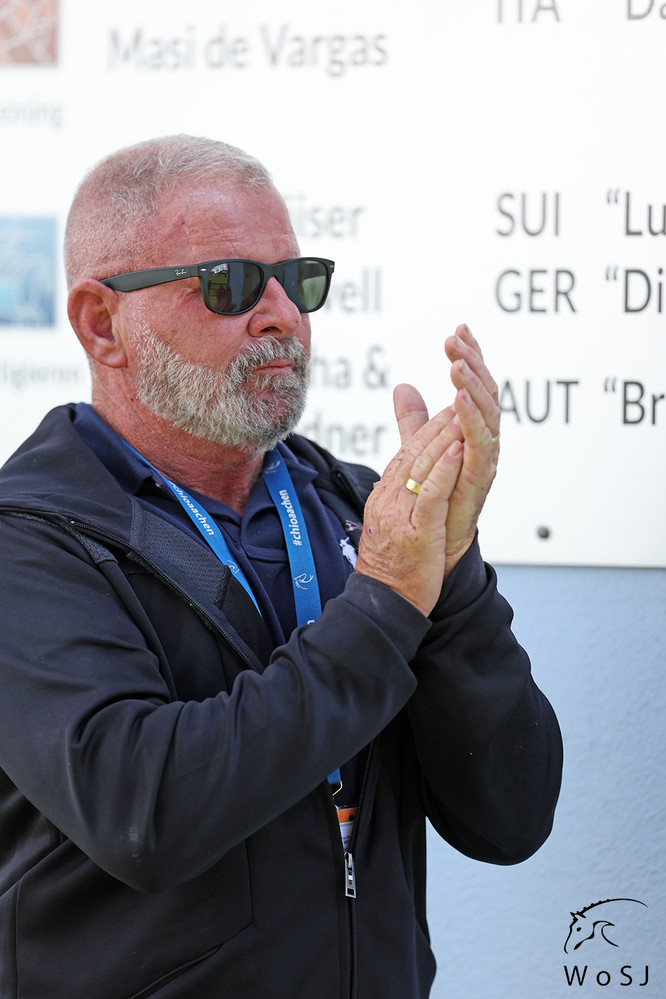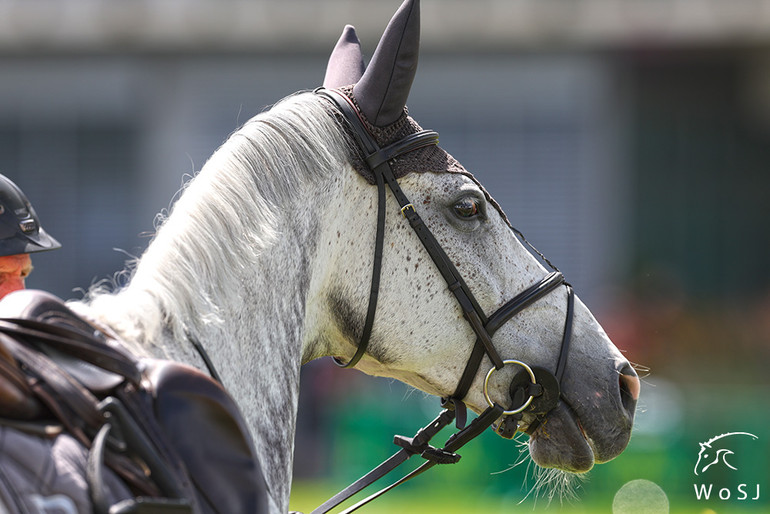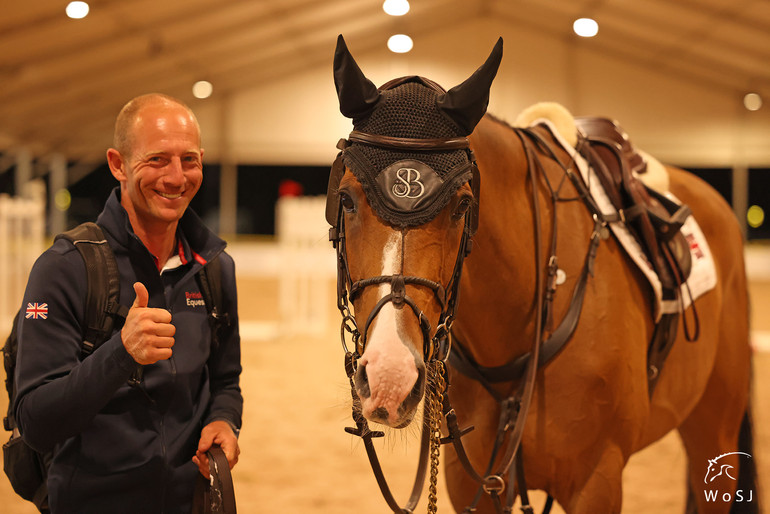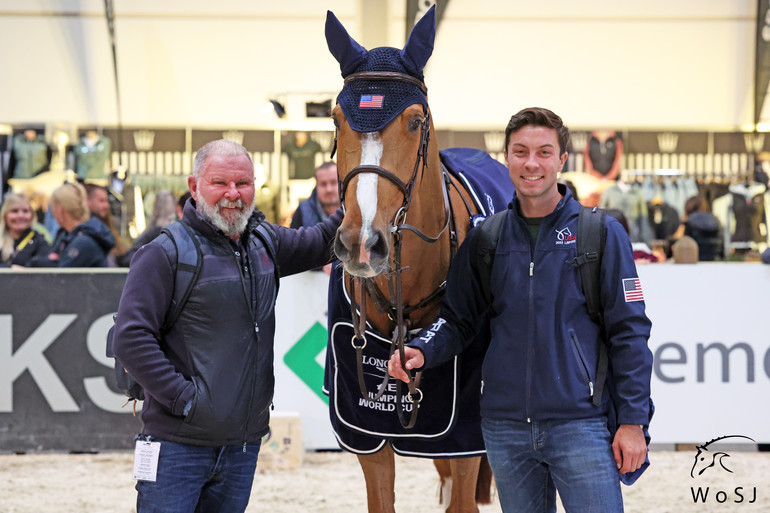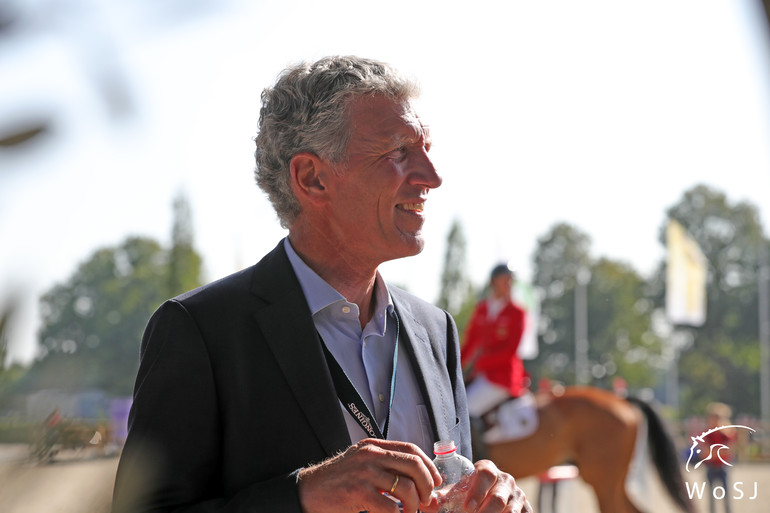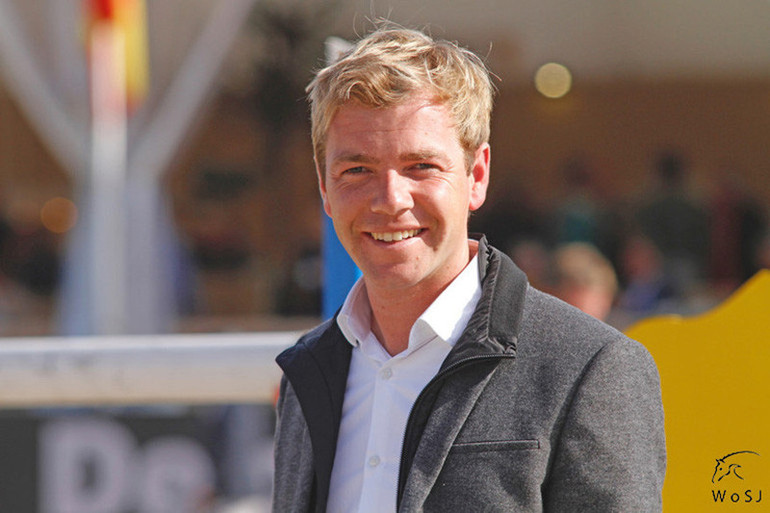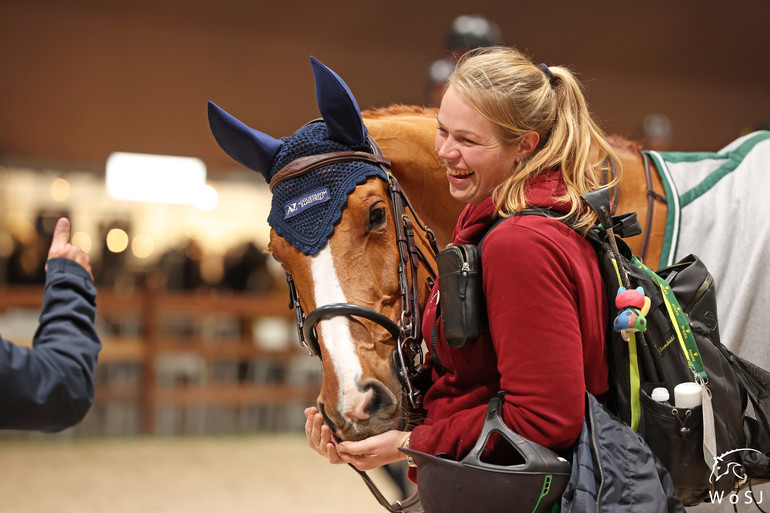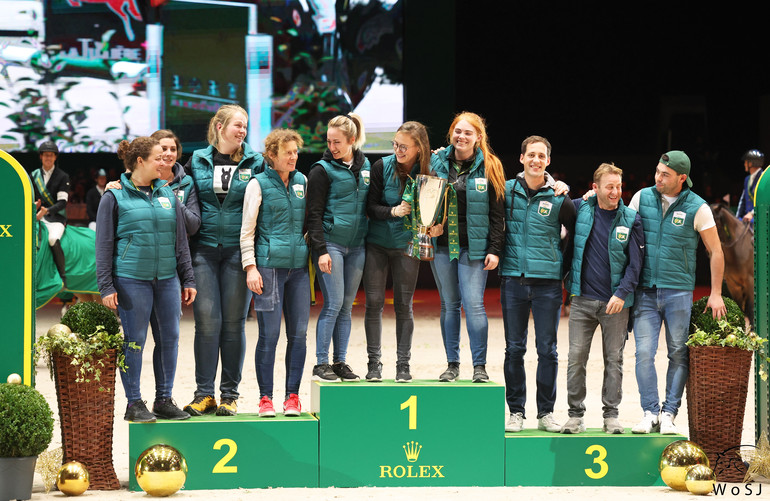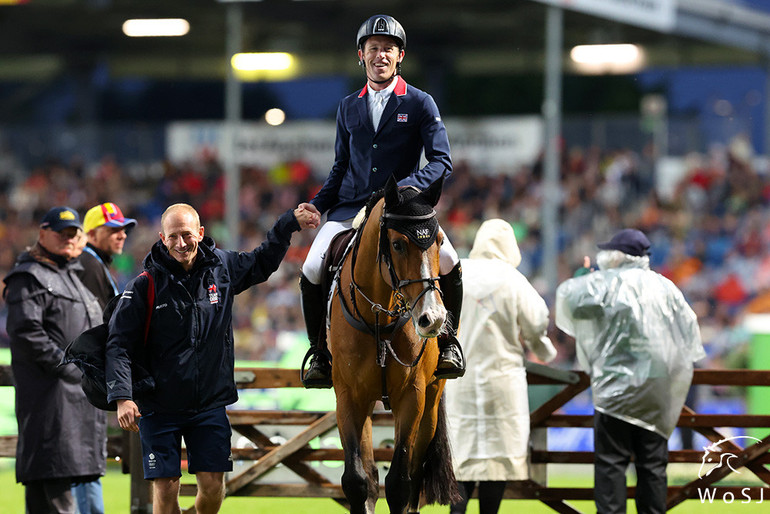Text © World of Showjumping
Good and knowledgeable grooms are vital for the equestrian industry. However, official numbers imply there is a huge lack of them: Currently, there are 247,444 different people registered in the FEI database within several categories, 5209 of them being grooms and 168,790 athletes. “In general, grooms are a dying breed. Something needs to happen to get people back into it, feeling like it is a career, and not only long, unappreciated hours,” Lee McKeever – who has worked with Mclain Ward for over thirty years – tells World of Showjumping. “We need to give grooms better working conditions, so that people want to do this job – and stay in it.”
But how do we make the occupation as a groom sustainable? How do we keep the grooms in the sport for longer, and how can we turn their careers into something they can enjoy for a lifetime and not only for a few years? How do we preserve their invaluable knowledge, and make sure it can be passed on to new generations? And who should be held responsible when it comes to the grooms’ working conditions? World of Showjumping spoke with Ludger Beerbaum, Scott Brash, Lee McKeever, Andrea Hoenack, Ken Ruysen and David Honnet to hear about their opinions.
A groom’s role
“First of all, I think we have to define what we expect from the grooms, and what their job actually entails,” Ludger Beerbaum begins. “For me, this is not a simple task; being a groom is not only about going to the shows – that is only one part of the many responsibilities a groom, by my definition, has. You need someone at home too, responsible for the daily work, and in charge of the nutritional, physiological and veterinarian aspects – as a few examples. These are several areas of responsibility, and to give it all in the hands of one person can mean expecting too much. If grooms on top of all the responsibilities at home also are expected to travel to shows, that is in my opinion asking a lot from one person. In the old days, many grooms did almost everything themselves, hardly ever having a day off. I think this is one of the reasons why this job does not appeal as one for a lifetime. When you are young, it might be exciting and you can enjoy the adventures while traveling, but you still have to be available for the needs of the horses most hours of the day.”
Grooms are absolutely key in what we do
“Grooms are absolutely key in what we do,” Scott Brash points out. “In general, they know the horses better than anyone, because they spend the most amount of time with them. Riders know their horses very well but there is no one that knows the horses better than their groom. Grooms are key when it comes to the welfare of the horses, and they play a massive role in what we as riders can do: They drive to the shows, they make sure everything is in order for us to get there and go into the ring and perform at our best. As a rider, you can get a lot of confidence from your groom in knowing that your horses are looked after at the best possible standard. We as riders could definitely not be doing what we do without them. They are invaluable members of the community.”
“It is a passion looking after the horses,” Brash continues. “I don’t think anyone gets into the industry for the money, I believe you get into it because of your love for horses. Growing up, I have seen yards where grooms were treated badly. I do think the industry has improved, but do I think it is perfect? No, I don’t – there are still big changes needed. However, I do feel that the majority of the riders see the value of their staff – at least I would like to think so.”
Bigger, faster, more
“While some areas have improved over the years, the show calendar nowadays is very full – and with long distances; the season is really intense with many big events to aim for,” David Honnet – who has worked with Scott Brash for the past seven years – says. “To me it looks like the industry might be growing too fast; there are more riders competing at international level, money is flooding the place, but everybody struggles to find good staff. I have always been lucky in my jobs and felt trusted and respected. However, I can see that everyone isn’t as lucky as I have been.”
“The main thing to understand is that even at the same event, the grooms’ lives can be very different depending on who they are working for,” Honnet continues. “Some grooms have to drive to the show – sometimes for days and nights – while others have a driver; some have to get up very early to lunge or ride on the flat; some are stressed by the competitions or by their rider; some are free to organise their work as they want to while others get told minute by minute exactly what they have to do. When the competitions are over, some have very little care to give to their horses, while others keep working for hours.”
Everything is just more and more; more money, more classes, just busy, busy, busy
“It gets harder and harder to do this job, and most of it has to do with the working conditions; the hours and the work environment,” Lee McKeever points out. “There are more and more shows, which means less downtime at home for the grooms. Everyone is getting burned out. I feel everything is getting bigger and faster, there is less time for it to be enjoyable. Everything is just more and more; more money, more classes, just busy, busy, busy. If you wanted to jump a five-star show every week, you could.”
Where have the good people gone to?
“Human resources is a challenging area in many industries at the moment,” Beerbaum says about the struggles of finding good staff. “People are not so committed anymore, and this is something we face in our industry as well. In terms of horsemanship being passed on, that is something we have to not only be aware of, but actively approach.”
We have to be aware that commitment and knowledge – people who are willing to do the job as good as possible – come at a certain price
“Furthermore, we have to make sure the jobs that we are offering are interesting and not only well paid, but comfortable enough for people to make a life out of,” Beerbaum continues. “It is easier said than done, but I think it is our obligation: We have a responsibility towards the horse. In the past people were willing to spend a lot of money on horses and then tried to bargain on the workforce, or with the farrier… That makes no sense. We have to be aware that commitment and knowledge – people who are willing to do the job as good as possible – come at a certain price, there is no question about it. If we don’t have grooms, the sport will die; if we don’t have riders, the sport will die; if we don’t have breeders, the sport will die… This is not only a grooms’ matter: I think the whole industry has to offer good conditions to stay sustainable.”
A healthy working environment
“A good relationship between the groom and the rider is important: You are putting all your trust into your team, for them to look after your best horses,” Brash says. “It is absolutely imperative that you get on well, share the same goals and visions. Of course, you are not always going to agree – it is healthy to have discussions on what is best to do for your horses – but there has to be a solid amount of respect from both sides. At the end of day, we spend more time with our grooms and horses than we do with our families.”
“I think respect is vital to ensure a healthy working environment,” Brash continues. “It is up to an employer to consider whether someone is having a bad day or being difficult because they have worked too many hours or have not had enough rest. Or are they perhaps overloaded with too many responsibilities? This is what a good employer does; you always got to look at yourself first and think, ‘what can I be doing better to make this right’? However, when it comes to someone just being difficult and hard to deal with for the other members of the staff, then those decisions are for you as an employer to take as well; the working environment has to be right for everyone. That is an employer’s responsibility in any walk of life.”
Respect is vital to ensure a healthy working environment
“The most important thing is the relationship between groom and rider,” Honnet agrees. “Grooms are for sure not all nice and simple, because to do this job long-term, you need to have a strong character! We are not always easy to put up with and it can get worse when we are tired. In general, you just have to look at a rider’s behaviour with their horses to guess how much love and respect they have for their grooms; and the other way around. There are so many ways to show respect with little gestures.”
“I have worked for Marlon for over ten years,” Andrea Hoenack says. “As a groom, a good relationship with your rider is the base of your work and a part of a good relationship is mutual respect; without that, you don’t get anywhere. Communication is important as well; as a groom you have to keep your rider informed. You also need a relationship where you can discuss things, not just be told. Unfortunately, I feel that many riders don’t have enough respect for their grooms and that is why people don’t stay for long in this job. Seeing some riders being disrespectful to their grooms and then wondering why they cannot find staff – sometimes they should just look in the mirror.”
Maintaining a good working relationship
One example of a successful long-term working relationship is between Ludger Beerbaum and his stable manager, Marie Johansson – his former show groom – who has worked for Beerbaum for over 30 years. “I have to be very grateful for the job she has done for my horses and also for me personally,” Beerbaum says. “We have probably given each other a few grey hairs over the years, but she is, without a doubt, a huge part of the success we have had. Maintaining a good working relation can be hard sometimes, on both parties; riders can have pressure from owners, high bills to pay, whereas the grooms are much closer to the horses and to their souls. Sometimes this can lead to conflicts, but you need to communicate and both sides have to understand each other. However, there are also limits; there is only so much anyone can do. Together, you have to find common ground – which sometimes means compromises – where both parties are comfortable.”
You got to believe in the people you work with; they can probably do as good a job as you can
At Beerbaum’s yard, his staff has breakfast and lunch together. “In general, it is more about the social approach to everyone,” he explains. “Having breakfast and lunch together means having a moment once or twice a day, where everyone can sit together and communicate. It is not about one being a groom, one being a rider, someone working in the office; it is about people sitting together, talking not only about horses but also about other subjects. It puts everyone in the same boat. It is different talking to someone face to face rather than just communicating via your phone. I think it has been one of the best decisions we have made here; it has been a great social input for all of us.”
“Another thing is stepping back and allowing other team members to step up and do their job as well,” Lee McKeever points out about how to make sure everyone thrives in their jobs. “You got to believe in the people you work with; they can probably do as good a job as you can. Everyone thinks that they are the best of the best, and their horses need them, but at the end of the day, someone else can do this job just as well as you – it is not rocket science. As a groom, you got to accept help.”
Working conditions at FEI shows
One of the biggest challenges for the grooms is the extremely variable working conditions at FEI shows, where many spend more than half of their week – often arriving on a Wednesday or a Thursday and leaving on a Sunday night. “Being an organiser here in the countryside with the facilities we have now, is easier than being an organiser in a city centre like Paris,” Beerbaum – who runs Riesenbeck International, a competition venue that hosted the 2021 FEI European Championships – says. “However, an event should always have a good schedule, so that the grooms are not up from 5AM to midnight – which happens many times during the indoor season. This is something I think all organisers have to respect. You cannot expect grooms to have a late-night class and then start working again at 6AM. Maybe if it happens once a year, that is ok, but not ten times, not all indoor season – also from the horse welfare point of view.”
“At the end of the day, these grooms and horses that are coming to your show, are the entertainment for your crowd so as an organiser you have to look after them,” Brash says. “It is not just about the riders, there is so much hard work that goes on behind the scenes that the public is unaware of.”
You cannot expect grooms to have a late-night class and then start working again at 6AM
“Now that we are in the middle of the indoor season, late-night classes become a problem again,” Hoenack points out. “In my opinion, classes should finish by 10PM – not later. If you have horses jumping early in the morning and you finish your day after midnight, then you get five hours of sleep if you are lucky. If the classes would finish by 10PM, you would at least get a chance of ending your day around 11.30 – which is still late. In addition to the long working hours and late nights, many grooms have to drive home, and sometimes you have venues where the grooms are under pressure to leave. Often you have to be out of the venues before 5AM the following day. When you had a weekend with late-night classes and little sleep, and then have to drive ten hours to get home, it gets dangerous.”
“Creating unrealistic working hours is the last thing we as show organisers want to do,” Ken Ruysen – event director at Peelbergen Equestrian Centre, and of Stephex Masters as well as Knokke Hippique – says. “However, a groom and a rider should communicate before the shows. Everyone can read the schedule before arrival and for example, at a show with both five- and two-star classes, with horses jumping in each category, the days can get long. It’s up to each employer how to organise their staff, and in these cases the riders should probably bring a second groom.”
Organisers should think about spreading the classes out a bit better, as well as finishing at a reasonable time
“It’s not just the late-night classes that are an issue,” McKeever points out. “Sometimes classes scheduled back-to-back is also hard, when you don’t have time to finish the horses in between and then you have three horses to do at midnight. Organisers should think about spreading the classes out a bit better, as well as finishing at a reasonable time. Horses get rushed because people are tired, and their feed times as well as their routines get disturbed – and we talk about horse welfare.”
“The show organisers can have a big impact on the hours we work depending on how they plan the schedule,” Honnet says. “I am not against evening classes, because I understand that is good for the public. However, then the time for flat riding or lunging cannot be from 5 AM to 7 AM. I believe this is very simple to solve: If you want evening classes, don't run other classes during the day, or alternatively provide enough arenas and space so that the horses can be exercised at any time during the day.”
Some of the show schedules and stabling areas aren’t very horse-friendly, never mind groom-friendly
“Another way to ease the pressure on the grooms would be more flexibility in the arrival and departure times at shows,” Honnet continues. “A venue should never be allowed to kick the horses out straight after the event is over. I think the horses should be able to remain on site at least 10 to 12 hours after the end of the last class so that the grooms have a chance to finish off their horses, pack the equipment and get a bit of rest before they start driving. Having help with your equipment when you arrive or leave the show is also a game changer.”
“The show organisers need to look better after the grooms,” McKeever says. “Some of the show schedules and stabling areas aren’t very horse-friendly, never mind groom-friendly. Furthermore, there should be quality food close to the stables and the times they serve it have to be realistic so that the grooms actually have time to eat. If you are at a CSIO5* star show and you are told that only the team riders’ grooms get meals, that is wrong – and the same if you have a five-star and a two-star show combined. People are people, a groom is a groom and there should be no difference in how the grooms are treated, regardless of star-level.”
“In this case, I think the CSI requirements should be the same worldwide, on all star-levels,” Hoenack says. “If you have a five-star and a lower star-level running at the same time, and the organisers only provide food for the grooms who work for riders competing in the five-star classes, that is not ok. On those occasions, they must provide food for everyone.”
“To show our respect for their hard work, we at Peelbergen provide a free breakfast for grooms at all our CSI events, regardless of star-level. That is perhaps something other organisers should look into doing too, as a small gesture,” Ruysen says. “As show organisers we need to communicate more with the grooms and get feedback from them. It is important to get a feel of how the working conditions are for the grooms and what we as organising committees can improve. Grooms should remember that they can talk to the organisers as well; they play a very important role in our community, and they should communicate directly with us on any issues they feel are relevant. We want to hear the grooms’ opinions and we will take action on it.”
Recognition
This year, at three FEI flagship events – the World Cup Final in Leipzig, the World Championship in Herning as well as at the Nations Cup Final in Barcelona – growing recognition for the grooms was on display, with the grooms named and shown on the screens next to their horses and riders. “I think it is a good sign of how valuable grooms are to the whole process and how integral they are to success,” Beerbaum says. “However, I think that eventually it all comes down to the relationship the grooms have with the people they work for and with: If there is a well-respected and recognized working relationship, the next step – which I think should come automatically – is the recognition of how important they are to everyone around them. If we only promote grooms, but don’t stand up for a good, respectful relationship, that is also not right. What really matters, is that the organisers truly understand the job grooms have and that they have to be respected, in terms of schedules, venue facilities and food – which would show general respect towards them. Another point to discuss is their accommodation at shows: Grooms need a proper bed, shower, toilets. Most riders would refuse to stay in the accommodations grooms are asked to stay in.”
If we only promote grooms, but don’t stand up for a good, respectful relationship, that is also not right
“Giving the grooms a small percentage of the prize money is something that is done in racing,” Honnet points out. “I think we could look at their system. With the technology today it should not be so complicated for the FEI to register all the grooms to know which groom is working at which event. How do we finance this? Very easy; take a percentage of the prize money. Yes, it will be a little bit less in the riders’ and owners’ pockets but if they really appreciate our work and dedication that should not be a problem. We should be open minded and look outside of our world: There are other industries and sports similar to ours, with a lot of travelling and long hours – like Formula 1. We should look into how they make it work for their staff, take inspiration from them and adapt it to our needs. Naturally, improvement always comes at a cost, but when you see the amount of money circulating within this industry, that should not be an issue. At the end, it’s not only about the size of the cake, it's also about how you cut it.”
Where do we go from here?
Over the years, the FEI has done its part in trying to integrate grooms and give them an official stakeholder role. The FEI Grooms Working Group’s first meeting took place in 2017, and following the FEI Sports Forum in 2021, The Grooms Consultative Group was created by the FEI with a mission to assist with the definition of a roadmap for the development of key structures for the grooms’ community – including the creation of a charter of rights and obligations for grooms. Then, eventually, at the FEI Sports Forum in April 2022, FEI President Ingmar De Vos signed a Memorandum of Understanding with the International Grooms Association (IGA) – a big step in the right direction when it comes to recognising the grooms within the FEI.
A change in the FEI Veterinary Regulations (Article 1008 – Stables) for 2023 approved by the FEI General Assembly 2022, also seems like another much needed step in the right direction as it mandates a closure of the FEI stables area for six consecutive hours overnight with minimal lighting and noise. Detailing the proposal for the rule change, the FEI wrote: “An additional point has been added to paragraph 6 in order to ensure that there is a scientifically supported minimum period of quiet and low light in the stables enabling horses to sleep. In addition, the change should facilitate the working conditions for grooms by ensuring a minimum break for sleep during the night.”
The grooms’ opinions should definitely be taken into account because they play such a key role, and they need a strong platform to share their views – for the betterment of our sport
“I think many of us feel like the FEI does not listen to anybody, not riders, grooms, owners, nor organisers, and just follows their own political agenda,” Honnet says. “However, I do believe we should give them a chance to do a better job. As grooms we mostly have to deal with the FEI stewards and to me they are like the referees in football. In France there is a saying: ‘We don't have the same shirt, but we have the same passion’ – and that's how I see them; we are not on the same team but there is mutual respect. Because every groom works for a different rider or company, under different national laws and regulations, with diverse situations, I believe the only way to improve their working conditions would be through the FEI. Unfortunately, that will not solve what can still happen when at home – it all comes down to jurisdiction.”
“The FEI is in charge of not only a sport, but an industry, and they have to listen to and respect the people that work with the horses on a daily basis and that have the FEI shows as their working space week in and week out,” Brash says. “The grooms’ opinions should definitely be taken into account because they play such a key role, and they need a strong platform to share their views – for the betterment of our sport. I do think a good grooms’ association should strive to really listen to the grooms and aim to make actual improvements to their working conditions. I believe grooms know the industry better than many of the FEI committee members, FEI officials, or FEI headquarter staff, so why not make sure they have an even stronger representation within the FEI? Like riders have an athlete representative, there should be a grooms’ representative too so that they have a solid say in the FEI protocols.”
No reproduction without written permission, copyright © World of Showjumping.com



